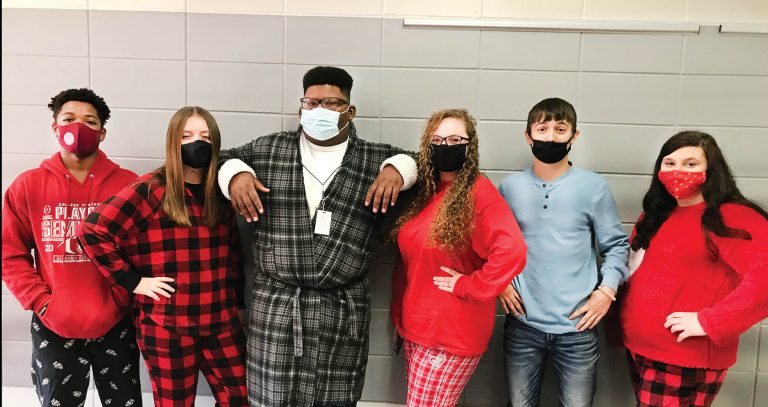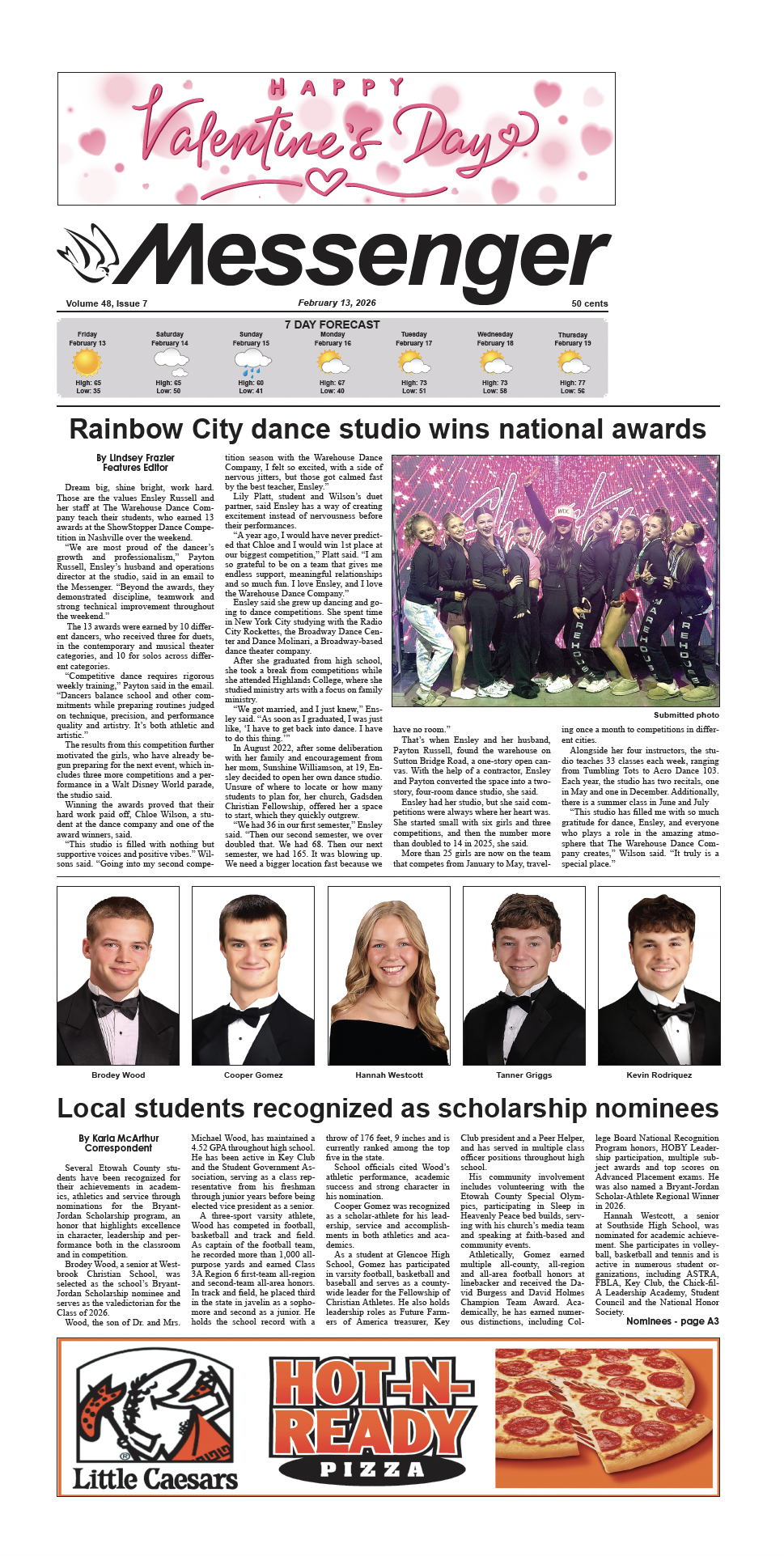Pictured above, Gaston High School students Kobe Harris, Randi Morgan, Ke’Sean Williams, Cailey White, Joseph Lockridge and Courtney Kidd participate in Etowah County School System’s Pajama Day that benefitted Sleep in Heavenly Peace on Giving Tuesday, December 1. Photo courtesy of Jennifer Knighten McGriff.
By Katie Bohannon, News Editor
Students and educators throughout Etowah County are reminding their community of the importance of generosity, unification and serving others. On Giving Tuesday, Etowah County Schools’ peer helpers partnered with Sleep in Heavenly Peace and hosted a system-wide pajama day to raise funds for an incredible cause.
Etowah County’s Peer Helper Initiative originated with Dena Cook, who discovered the program via the Jennifer Claire Moore Foundation. The peer helper concept derives from the reality that when a young individual is faced with a hardship or challenge, or when seeking advice or encouragement, he or she might feel more comfortable turning to his or her peer first before an adult.
Students interested in becoming peer helpers undergo an application process, completing a questionnaire and writing an essay that conveys why they chose to participate. Trained and supervised by professionals, peer helpers serve as mentors, mediators, tutors and advocates for their peers. They explore educational, societal, behavioral and educational challenges that all students experience, implementing specific curriculums that address difficult topics relevant to youth. Sensitive issues like depression, bullying, grief, body image and drug and alcohol abuse are discussed through campaigns designed to uplift students and remind them of the amazing support system that exists within their classrooms.
Gaston High School received 29 applicants this year alone, and following such incredible interviews, the school decided to introduce all 29 students as powerful sources of kindness and inspiration within their campus.
Gaston Junior Ke’Sean Williams is one of those 29.
“I think we serve as counselors to people who need our help,” said Williams. “If somebody is going through something, we can be there to help them and try to tell them that it’s going to be alright, that somebody is on your side. We just try to be there for people our age, because we all go through things. We don’t want to lose someone because they thought nobody was there for them.”
Williams understands the pressures of youth and how so many young individuals endure difficult circumstances that often leave them feeling helpless and alone. But Williams emerges as a brilliant light, and through his quiet leadership and motivating example, he represents the trials he faced and overcame, and the people who supported him throughout his journey. Following the loss of his father, Williams recalled Gaston educators who influenced his life for the better and inspired him to do the same.
“I felt like it was my business to help, to step in and help anyway I can,” said Williams. “That’s what inspired me [to become a peer helper]. I’ve had people help me before. Even Ms. Knighten helped me out – a year ago, she made sure I had food. When I wore a windbreaker, Ms. Campbell got me a jacket because it was cold outside without knowing the real story. It made me realize, ‘Oh. They really care about you.’ I had the right people to instill in me it’s good to help somebody else.”
Williams shared how he makes himself available to his peers, letting them know that he remains a listening ear when they long to speak or a quiet comfort when silence is best.
“Everybody has a different story,” said Williams. “I just let them know you can come to me. If they don’t want to talk about it, we can find something else to do to get their mind off of what is going on. If they don’t want to talk about it, use respect and don’t talk about it. Ask them some questions about themselves, try to not make them think about whatever is going on at home. School is a safe environment for people who have things going on at home. Nine times out of 10, when they get to school, they don’t want to talk about it because they know they’re going to endure it again when they go back home.”
Gaston educator and Peer Helper Coordinator Jennifer Knighten McGriff equates Williams with Simon Sinek’s Leaders Eat Last, envisioning him as a leader who resides among his peers as an ever-willing and ever-present help. McGriff serves as a coordinator along with Gaston faculty members Janet Wilson and Shelby Bobo. McGriff noted that confidentiality is paramount with the peer helper program, and the helpers are required to sign a contract that details the program’s expectations of their services. While there are things helpers are expected to adhere to and things helpers are expected to avoid, this higher standard creates a structured and regulated program that develops a safe space for other students. McGriff expressed her admiration for her Gaston helpers, emphasizing their proactive nature and the continuous flow of ideas that pour from the group.
McGriff shared that during her first semester at Gaston, she noticed a student upset because she missed the career tech bus. When McGriff inquired as to why she was so troubled, the student explained that she was collecting wood to build a bed for herself. She had been sleeping in a chair.
Last year, McGriff connected with Tommy and Val Goodman, the representatives for the Gadsden chapter of Sleep in Heavenly Peace. A nonprofit nationwide organization, Sleep in Heavenly Peace strives to provide beds for children ages three to 17. The nonprofit builds, delivers and assembles beds for children and teenagers throughout the country, ensuring that they receive a comfortable and sturdy place to rest their heads each night.
“People don’t even realize how many kids are not sleeping in a bed every night,” said McGriff. “It impacts their learning if they’re not sleeping. You can’t focus – same thing if you’re hungry.”
Inspired by the SHP’s mission, McGriff sparked a partnership with SHP and Etowah County peer helpers. In 2019, Etowah County Schools hosted a pajama day fundraiser, where students could donate $2 to wear their favorite PJs or lounge wear for a worthy cause. That fundraiser alone raised $8,000 for SHP.
But the peer helper program’s relationship with SHP does not end with a fundraiser. Gaston hosted a bed build on its campus the following spring, where peer helpers from neighboring Etowah County schools joined Gaston to build 55 beds for children in the community.
This year proves no different, with Etowah County Schools raising $5,000 (and counting) for the nonprofit. Gaston plans to walk in the same generous footsteps as last year, hosting another bed build on May 8.
“For me, being involved in Sleep in Heavenly Peace and the peer helper program here is about changing lives,” said McGriff. “I think it’s about the bigger picture. Yes, we need to teach kids all of the curriculum and our content. But we also need to teach them to be citizens, and willing to go out in the community and do their part to help other people.”
Peer helpers hold the vision for that bigger picture. Rather than battle life alone, peer helpers outstretch their hands to create safe and welcoming spaces for their classmates to understand that regardless of their situation in life, a caring source is always present. Dedicated educators like McGriff, Wilson and Bobo nurture that hope within their students to foster kindness, generosity and evoke progressive change. While peer helpers implement campus initiatives, they also represent positive influences in their community, from building beds on their school campus to volunteering on Thanksgiving, giving meals to families in need. Peer helpers like Williams prove that no age is too young to emerge as an empowering force – to affect lives for the better, to strengthen others and spread a message of hope when their peers need it most.
“Give people an opportunity to lead and they’ll lead,” said McGriff. “Give people an opportunity to help and they’ll help. Oftentimes, it’s that people don’t know how or they don’t know where to start. They don’t know how to start campus initiatives. But if you just facilitate the opportunity, I feel like people are genuinely good. All these kids, they amaze me the way they’ve stepped up and taken ownership of the program. They love each other – they are a family within the program.”






